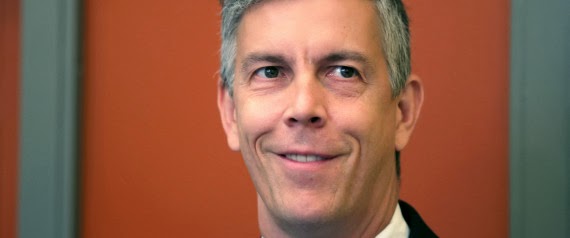Michael Klonsky’s SmallTalk Blog: More from the ‘Bottom of the Barrel’
While teachers in America often come from the bottom of the academic barrel and are disproportionately teaching students from disadvantaged backgrounds, Duncan said, teachers in South Korea are selected from the top of the class and are rewarded for working with low-income students.-- U.S. News
In fairness to Duncan, he didn't actually use the words "bottom of the barrel". He said that a significant proportion of new teachers come from "the from the bottom third of their college class." Same difference as far as I can tell.
Duncan's shares his outlook on teaching with those at the Council on Foreign Relations or at the World Bank, who view public education primarily in the context of global economic and military competition. For Duncan, the role of schools is to provide the "human capital" for American corporations and the military industrial complex. He lays it all out in his 2011 remarks to the World Bank ("Improving Human Capital in a Competitive World—Education Reform in the United States”).
In many respects, our vision of reform has a great deal in common with the World Bank’s forthcoming Education Strategy for 2020. We share your commitment to results—to accelerating the acquisition of skills and knowledge. We share your commitment to cradle-to-career reform for students.
I love your credo “Invest early. Invest smartly. Invest for all.”
In class last night, many of my grad students expressed their disappointment, dismay, anger over Duncan's latest debasement of the teaching profession. One compared it to the old adage, "those who can't do, teach."
I'm not sure about the origins of that one. It supposedly comes from George Bernard Shaw's Man and Superman.
Bob: I'm so discouraged. My writing teacher told me my novel is hopeless. Jane: Don't listen to her, Bob. Remember: those who can, do; those who can't, teach.
Many of us can remember the pain inflicted by a discouraging teacher, parent or friend who told us to give up on a dream (mine was playing in the major leagues). But what could be more discouraging to students with dreams of becoming a teacher one day, than the remarks by the Sec. of Education?
I asked my students, who I would match up intellectually with Duncan or any of his fellow Harvard grads, isn't teaching "doing"?
The students read a N.Y Times Op-Ed piece on John Dewey's vision of learning, "Learning as Freedom" by Michael Roth, who asks,
Who wants to attend school to learn to be “human capital”? Who aspires for their children to become economic or military resources? Dewey had a different vision.
Perhaps we need to restate Shaw's adage this way:
Those who can't teach become sideline critics, corporat reformers, or D.O.E. bureaucrats.
This blog post has been shared by permission from the author.
Readers wishing to comment on the content are encouraged to do so via the link to the original post.
Find the original post here:
The views expressed by the blogger are not necessarily those of NEPC.

